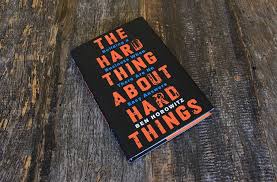One version of a business book – the kind I don’t recommend – consists of a series of Powerpoint-ready bromides matched to business anecdotes and sports analogies about achieving success, explaining the keys to the author’s path. The author did well, here’s the path, so you should try it as well.
A better version of a business book[1] – and Ben Horowitz writes The Hard Thing About Hard Things in this mold – is to describe all of the mistakes, sleepless nights, and layoffs endured on the way to success. This has the virtue of being a truer version of events, and a more realistic guide to the entrepreneur on the difficult journey.
I do recommend this book.
The first one quarter of the book – his origin story – is the most exciting and best written. After an early career of moderate success as an engineer at Silicon Graphics, NetLabs, and Lotus Development, he applied in 1995 for a job at Marc Andreessen’s startup Netscape. Following that extraordinary success and crashing failure, Horowitz went on to lead a company called Loudcloud.
He tells exciting stories about that painful experience, which flamed out, only to rise from the ashes as Opsware, which sold to Hewlett Packard for $1.6 billion. After that, Horowitz joined again with Andreessen to lead the venture capital firm Horowitz-Andreessen.
 I have my own origin story about flaming out in a painful way, and seeking redemption. Unlike Horowitz, I did not then go on to lead my lost-for-dead company to a billion-plus valuation and parachute into being a leading venture capitalist.[2]
I have my own origin story about flaming out in a painful way, and seeking redemption. Unlike Horowitz, I did not then go on to lead my lost-for-dead company to a billion-plus valuation and parachute into being a leading venture capitalist.[2]
Horowitz never sugarcoats the role of leading a company as CEO. The remaining three-quarters of the book – which appear to be a compilation of blog-post advice on business leadership – continue the theme of difficult times.
Some highlights:
- Expect multiple incidents of declaring WFIO (We’re Fucked, It’s Over)
- Leading sometimes means “choosing between horrible and cataclysmic.”
- The decisions that lead to inadvertent politicization of the office
- On firing employees the right way
- Shortcuts in management that lead to huge problems later
Horowitz is funny. He’s willing to tell stories about his failures, which is endearing.
He insists on headlining chapters with hip-hop epigraphs, which is either a terrible affectation or honestly come by. I don’t know him, so I can’t judge.
 He lapses into more clichés and business bromides in the latter part of the book. When confronting problems, Horowitz notes, “focus on the road, not the wall.”
He lapses into more clichés and business bromides in the latter part of the book. When confronting problems, Horowitz notes, “focus on the road, not the wall.”
“When someone learns to drive a race car, one of the first lessons taught is that when you are going around a curve at 200 mph, do not focus on the wall; focus on the road. If you focus on the wall, you will drive right into it. If you focus on the road, you will follow the road. Running a company is like that.”
Ok, whatever. That is typical business book/sports analogy bullshit, even though we know what he’s trying to get at. I’m so tempted to write a Jack Handey version of that.
Anyway, just focus on the first quarter of the book. It’s exciting. You could read this as a “how to be a CEO” book, and as such it’s a great series of warnings about how difficult it will be, how often you will screw it up, how many sleepless nights you’ll endure, how frequently you’ll be winging it and hoping for the best. Horowitz has deep credibility and good stories.
[1] The best version of a business book – which I would like to write some day – is from the businessperson who simply writes about his failures as a kind of counter-guide. A “How Not To Invest” or “How Not To Start A Business” guide. I don’t know if I could ever get this sold to an editor, but if you know someone who wants that, hit me up with a DM. I’ll send you an outline of the book.
[2] Other than that, though, very similar trajectories.
Post read (758) times.

